Opinion
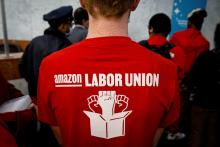
Corporations, politicians, and other monied interests are often trying to find ways to derail organizing. The failed Amazon union drive back in April 2021 is certainly a notable example of this. Yet as labor scholar and activist Jane McAlevey points out, it’s also true that the reason the Retail, Wholesale and Department Store Union failed in Bessmer, Ala., was because they didn’t organize and incorporate support from local faith communities. McAlevey writes, “The media often played up the faith-based aspect of the campaign, with key staff of the effort being faith leaders or people of faith themselves. But there was a near-total absence of Bessemer or local Birmingham faith organizations on the endorsement list of the campaign.”
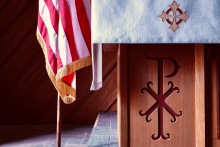
In Keeping Faith, philosopher Cornel West explains that our investment of “existential capital” in the nation-state leaves us with “a profound, even gut-level, commitment to some of the illusions of the present epoch.” We experience amnesia when we allow our nation’s myths to be the foundation of our current reality.

Copaganda refers to any piece of media that portrays police as a necessary social institution. While this can include viral videos of police chatting with neighborhood kids or doing lip-sync battles, the most pervasive examples of copaganda are found in pop culture.

Hawley's accusation that Jackson is soft on crime reveals a troubling perspective on people who enact harm. Hawley is one of several Republican senators who sorts the world into two types of people: People who are evil and, if given the chance, will commit horrific, reprehensible crimes over and over again, and people like the rest of us, people who need to be protected from the evil people. According to this line of thinking, ensuring this protection shouldn’t rule out the harshest measures of isolation and punishment the state can enact. We separate “them” from “us” by forever marking them as dangerous.

March 31 marks the annual International Transgender Day of Visibility. I will confess that I only recently became aware of this day, which is “dedicated to celebrating the accomplishments of transgender and gender nonconforming people while raising awareness of the work that still needs to be done to achieve trans justice,” as GLSEN, an organization that advocates for LGTBQ issues in K-12 education, puts it.

The Bulgarian town where director Ivaylo Hristov’s latest film takes place is never named, but the movie’s title offers a suitable stand-in: Fear. This coastal village on Turkey’s border reeks of terror, but not the kind one might expect.

As Hebrew Bible scholar Walter Brueggemann has reflected, the imprecatory psalms put words to our thirst for vengeance. In praying these psalms, we process our rage and give our violent impulses over to God. “O God, break the teeth in their mouths,” one psalmist prays; “let them be like the snail that dissolves into slime” (Psalm 58:6, 8). I’m all for this kind of prayer. I’m all for praying the entire range of the psalms — even the ones that sometimes make us uncomfortable or aren’t necessarily welcome in church. And if there is any occasion for an imprecatory psalm, certainly Russia’s invasion of Ukraine, in all of its brutality and sheer horror, is one of those occasions.

March is the most underrated month. In it, winter makes room for spring in a million miraculous ways. These changes are imperceptible unless you slow down and pay attention.

Earlier this week, I attended the confirmation hearing of U.S. Supreme Court nominee Judge Ketanji Brown Jackson. Outside, spring in the nation’s capital was in full bloom, with cherry blossoms beginning to dot the landscape — signs of hope, growth, and new beginnings echoed in the liberative invitation of many faith traditions’ spring holidays, including Passover, Easter, and Holi. Inside at the hearing, the mood was equally hopeful: Jackson's nomination offers a new beginning — a new direction for the court and our country, and a hope for the future.
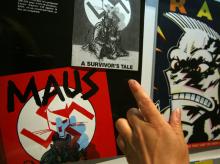
In Maus, Jews are drawn as anthropomorphic mice, while Nazis are portrayed as cats. The book chronicles the Spiegelman family’s attempts to hide from the Nazis, showing the harshness of life in the ghetto, the desperation of parents attempting to protect their children, and the cruelty of Jews in concentration camps. It even addresses the lingering impacts of the generational trauma of the Holocaust on the Spiegelman family in a way that can only be expressed by someone who experienced it firsthand. The story it tells is dark and disturbing, but the story of Spiegelman’s father and the story of the Holocaust requires such a telling.

Using theologically diverse Christian figures ranging from Billy Graham to Mister Rogers, Mayfield offers examples of what insecure attachment to God can look or feel like, including feelings of doubt, shame, or distancing. Leaning heavily on attachment theory — a theory that examines relationships and the nature of the bonds between people, especially between caregivers and children, romantic partners, and close platonic relationships — Mayfield provides a relatable guide to assist folks with identifying the deeper questions and beliefs behind some of our spiritual frameworks.

As a journalist in the religion and social justice realm, two stories dominated my newsfeed this week: Russia’s ongoing invasion of Ukraine and sexual harassment at Christianity Today. Both reinforced to me the power of documentation.

Lately I’ve been thinking a lot about clothes — their power both to oppress people but also advance justice. If this sounds far-fetched, I invite you to reach deep into the pockets of the clothes you are currently wearing. Go ahead, try it.

This spring, I’m thinking about the season as a blooming period for the complexities of truth. That’s not to say that truth itself is complicated, but that the application, acknowledgment, or apprehension of truth can be a sticky mess. Truth will set you free, but then we get to wrestle with freedom and the responsibility that comes with it: Realizing that racism is ingrained in the church is important, for instance, but acting to rid the church of that sin is paramount.

Lent is the angstiest season of the liturgical calendar: Jesus in the desert with the devil; us sitting with our sin and mortality. So below you’ll find six songs to accompany you this brooding, contemplative season. Soon, Easter will roll around and bring with it upbeat resurrection bops, but for now, the tunes are appropriately emo — at least lyrically.

"Theology is lived. It doesn’t take place just in the mind but in the body as we engage with and learn alongside others. I learned about God while in the garden with my abuela picking avocados from the tree for our afternoon snack. My understanding of God is shaped not only from my experiences but from the community around me—those who formed me in both the past and present. I think this is key to abuelita theology."

Although deconstruction has been a disorienting process, I feel myself breaking free from the oppressive ideologies that locked me in static racial and gender hierarchies. It has allowed me to find value in our unique narratives as well as our partnership with God and the community of creation.
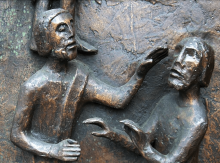
Time after time, these Christians would lay hands on me while I waited in line at Starbucks or the food court at the local mall. They’d try and cast out evil demons, pray that my faith would be strengthened, or command in Jesus’ name that I get up and walk (even though I could already walk). Each time, they would stand back as if they’d just recited the magic words. Each time, with progressively less optimism and greater anger, I’d step forward only to find out I wasn’t healed. Some would accuse me of not having enough faith, but most just apologized and went on with their day. I was left alone. Still limping, still furious.

Pew Research conducted a study in 2020 examining teens’ relationship to religion compared to their parents: data from that report showed that while 43 percent of parents claimed religion was “very important to them,” only 24 percent of teens answered similarly. In 2021, Springtide Research Institute, where I am a student ambassador, found that 52 percent of young people believe that religious communities are “rigid” and too “restrictive.”
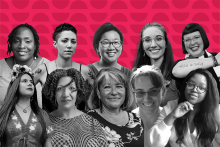
For the past six years, Sojourners has celebrated Women’s History Month by sharing a list of Christian women who are bringing us hope and inspiring us to action. This year’s group includes pastors and poets, abolitionists and mothers, liturgists and storytellers; women who question authority, disrupt unjust systems, set boundaries, reimagine what’s possible, and pray.